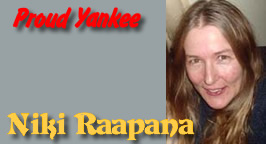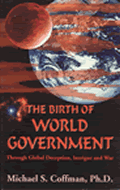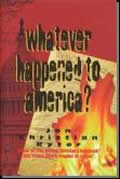JOIN THE "QUIET REVOLUTION"
By Niki Raapana
March 29, 2009
NewsWithViews.com
We sure hear a lot of talk about revolution these days. There's the Ron Paul Revolution, the Revolution Against Evolution, the Revolution of Change, the Internet Revolution, the Carbon Revolution, the Green Revolution, the Obama Revolution, the Alex Jones Revolution Against the New World Order, and the Jesus Revolution. It's too bad we don't hear more about the Quiet Revolution. This is the global-to-local policing revolution, and it's getting quietly stronger every day.
"In the U.S. community policing originated as a "quiet revolution" seeking recognition in the 70s (Kelling, 1988; Greene, 1989) and has since become a tour de force to be reckoned with in the 90s. (Bayley and Sheering, 1997; Rosenbaum, 1994; Cordner, 1989). " Community Policing in China: Continuity and Change, by Kam C. Wong, 2000
The tactics for the new paradigm shift in domestic policing began in urban ghettos and HUD projects in the 70s. HUD employees wrote and published The Broken Window Theory. It was used by the community cops to test "innovative strategies of enforcement." Part of HUD's untested theory was that poor neighborhoods and the people in them are the cause of "full blown fear." According to Kelling, this happens when there are old houses and unlit streets and yards, which creates an atmosphere of "feeling that nobody's in charge and nobody cares."
"There are at least two areas where the federal government can and should act to promote security in inner city neighborhoods: (1) Community Policing for inner city residents (2) Drug treatment for inner city offenders." The Essential Communitarian Reader, by Amitai Etzioni, 1998.
The new strategy was to build federal partnerships with communities and look for innovative ways to solve neighborhood problems. This became known as POP, or Problem Oriented Policing. Officers were trained in a formula called SARA (Scanning, Assessment, Response, Analysis). The first step in any POP investigation was to "scan" the neighborhood and identify all the possible players associated with the potential problem. The police went door-to-door doing Knock-and-Talks, asking residents to identify any suspicious acting people in their neighborhoods. This information was programmed into a GIS (Geographical Information System) database. Once the identified target citizen's data was in their computers, the GIS could do more than just tell city electric workers where the cables were buried. The advanced GIS performs Potential for Crime Analysis in Identified Hot Spots.
"When Professor Herman Goldstein of the University of Wisconsin Law School developed the concept of problem-oriented policing (also known as community policing and neighborhood policing), he must have envisioned what an important role this theory would have on the future of police work. Professor Goldstein's theory is based mostly on what seems to be a common-sense way of approaching crime problems in the community, that is, to address the problems that cause or encourage criminal activity not merely to enforce the laws that prohibit such activities. At the heart of every community-oriented policing program is this concept."
Based on the data analysis, community oriented police would plan a response to the potential threat. Many a home was purchased for well under market value after problem homeowners identified by their neighbors as "noisy, probably an drug dealer and/or a prostitute, with dirty kids" were happy to move out of the neighborhood. They became known as "willing sellers." The final stage of SARA was to analyze the effects of the citizen driven response and share that data with other comunity police around the world.
"Community Safety and LA21: 8.6 Just as a fair and equitable society is essential for a sustainable future, so too is an environment in which people are free from crime and the fear of crime. Since 1993, a highly localised multi-agency Community Safety Partnership - involving the Council, Police, Probation Service, voluntary sector and the local business community - has been working to combat crime, vandalism and anti-social behaviour in the Borough. The effectiveness of this approach and the broad range of crime prevention measures implemented as part of the Community Safety Strategy have helped to make Tameside a safer place for the whole community. Community Safety Plan: 8.7 In preparing the Community Safety Plan for Tameside required by Government during 1998, the Partnership recognises that crime prevention initiatives must be complemented with actions aimed at changing attitudes and behaviour, if there is to be a lasting reduction in the levels of crime and anti-social behaviour."
The official federal Office of Community Oriented Policng Services (COPS) was established in 1994, authorized under the Violent Crime Act. Clinton gave it the big "push." Over the next several years 100,000 COPS were hired in cities and towns across America. At the same time, Community Policing was introduced in the UK, South Africa, and across the globe. (A year later the Domestic Violence Act was introduced across the world in much the same pattern, in GB and the US on the same day, and expanded on the POP philosophy).
The political idology behind community policing is called The Third Way. The Third Way is a synthesis of the right and the left that originated from Sir Evelyn de Rothschild, Lynn Forrester (later de Rothschild), Michael Steinheart and Al From. Bill Clinton was the first candidate chosen by the Democratic Leadership Council (DLC) to run for US president. Tony Blair, Clinton's buddy from Oxford, was the Third Way candidate in Great Britian. When Clinton and Blair won, the New Democratic Movement transcended the right v left conflict and reinvented the world.
"New Democrat policies transcend the stale left-right debate and define a Third Way for governing based on progressive ideas, mainstream values, and innovative solutions that reflect changing times. New Democrat ideas that have become law include national service, work-based welfare reform, charter schools, community policing, an expanded earned-income tax credit, and market incentives for environmental protection." Overview, June 1, 1998, About The New Democrat Movement
The PPI (Progressive Policy Institute) is the think tank for the Third Way Democrats. (Their website used to say their purpose was "to define the ultimate Third Way.")
"PPI has long promoted innovative strategies for preventing crime. For example, its work in the early '90s inspired the Clinton Administration's "100,000 cops" initiative as well as its support for community-oriented policing. Building on this foundation, PPI has launched the Community Crime Fighting Project aimed at identifying and promoting the next generation of crime-fighting ideas and technologies. The Project works to develop a Third Way on crime and public safety that transcends the right's singular focus on punishing crime through maximum incarceration and the left's fixation on more social spending to address the "root causes" of crime. The new approach instead envisions refocusing every part of the criminal justice system on empowering communities to take charge of their own self-defense." PPI - Project Description | June 29, 2000, About PPI's Community Crime Fighting Project
In Seattle, the man who introduced Community Policing was a former officer from San Diego, Norm Stamper (the Chief retired after losing the November 1999 WTO Battle of Seattle). Throughout the 1990s, the City of Seattle created numerous new agencies to handle the new development objectives. One of these was called the Department of Neighborhoods, directed by Jim Diers*. In the spring of 1999, the City of Seattle began working with COPS to write sustainable development visions for all 37 neighborhoods. Planning groups followed the guidelines laid out in the WA State Growth Management Act of 1990 combined with suggestions recommended at the 1992 Earth Summit and advisors from COPS.
"Linking anti-crime efforts with economic revitalization activities in high-crime neighborhoods, addressing the single greatest impediment to private-sector investment while providing economic opportunities for at-risk populations." PPI - Project Description, June 29, 2000, About PPI's Community Crime Fighting Project
The blueprint for restructuring the world and global economic revitalization is called UN Local Agenda 21. This plan calls for a complete reorganization of local government based on expanded data gathering and mapping plans, using multi GIS information layers requiring clearances where personally identifiable facts or gossip is stored (called anecdotal data).
Adhering to the successful SARA model, City inspectors began ticketing homeowners for violations of Local Agenda 21 land use regulations. Since Safe and Affordable Housing is a UN Human Right, all housing must be regularly inspected for code violations. Thousands of Seattle residents refused to invite the inspectors inside their homes. Unable to gain entrance to so many homes without a valid warrant, and thus unable to complete their interior safety inspections, the City planned other innovative ways to gain access to the insides of private dwellings. In a memo to Seattle neighborhood groups in 1998, SPD Chief Stamper called the 4th Amendment requirements for a legal search warrant "an identified barrier to the program."
Chief Stamper was replaced by Chief Gil Kerlikowske in early 2000. Prior to joining the Seattle Police force, Kerlikowske was Director of Grants for Community Oriented Policing Services in DC. While there he helped create an innovative way to expand the GIS database using a program called COMPASS.
"One of the core elements of the COMPASS initiative is the creation of a data infrastructure which contains information from a variety of sources. These data will include extant social indicator data (e.g., employment statistics; housing information; land use data; school data; hospital records; asset mapping) and a host of safety information (e.g., incident-based crime data; arrest statistics; calls for service; court and corrections data; victimization surveys; and fear of crime data)."
"Asset mapping" is included as a "core element[s]" of Kerlikowske's database.
In June 2001, John (Jody) Kretzman was the guest speaker at Seattle's Town Hall. He introduced local neighborhood group leaders to an alternative approach to mapping neighborhoods. His program was called ABCD (Asset Based Community Development). He said the focus had changed from identifying problems to identifying assets, which he assured the room was a much more positive approach to rebuilding community. His books included "Mapping and Mobilizing Community Capacity" which suggests an 11 page interview of all residents. Working with concerned neighborhood volunteers, the COPS could go door to door asking people to help save the community by answering all the questions about their skills and abilities. Of course during these interviews COPS and city employees are "trained" to look around for "any other life-threatening things" they might be able to see. The Seattle City Attorney's office spent years on their "Top Ten" list, included were "unlocked dumptsters" and "messy kitchens." All this data is then entered into COMPASS.
Professor Jody Kretzmann, Co-director of the Asset Based Community Development Institute at Northwestern University was later to become a member of Senator Obama's Urban Policy Committee (Michele Obama is listed as Domestic Faculty at ABCD) His Co-Director at ABCD, John McNight was one of the men who trained Barack Obama to identify and organize community assets. He also signed Obama's Harvard Law School application. (See: John McNight - My Student Barack Obama (82,83,84), Another PPI recommendation to the federal expansion of community policing was the creation of Fusion Centers.
"2. Creating a national-level intelligence fusion center within the Department of Homeland Security as a complement to the National Counterterrorism Center" PPI | Policy Report | September 12, 2008, Getting Intelligence Reform Right By Jim Arkedis.
There is a lot of attention being paid to Fusion Centers now. A Missouri cop leaked Fusionst documents to someone on Alex Jones' staff. The report has since been verified and admitted to by the Missouri State Police. The analysts' report, based on COMPASS data, predicts the followers of presidential candidates Ron Paul, Bob Barr and Chuck Baldwin have a potential for domestic terrorism. This revelation, along with the Child Safety Act, the proposed Gun Registration regulations, and Monsantos' proposed Food Safety Act has many registered Independents, Libertarians, Republicans, Constitutionalists and even Democrats talking openly about an inveitable coming civil war against the feds.
Obama's
new Drug Czar, not only the creator of COMPASS and a founding Director
overseeing millions in initial COPS hiring and training grants, is an
expert in fusion centers. He explained Fusion Centers in his statement
before the UNITED STATES HOUSE OF REPRESENTATIVES COMMITTEE ON HOMELAND
SECURITY'S SUBCOMMITTEE ON INTELLIGENCE, INFORMATION SHARING, AND TERRORISM
RISK ASSESSMENT REGARDING BUILDING
A PARTNERSHIP STRATEGY: IMPROVING INFORMATION SHARING WITH STATE &
LOCAL LAW ENFORCEMENT AND THE PRIVATE SECTOR, MAY 25, 2007, 1:00 PM
BELLEVUE CITY COUNCIL CHAMBERS, BELLEVUE, WA:
"And we are in the process of designing and implementing a regional fusion center which seeks to integrate, to the greatest extent possible, private sector participation. The City of Seattle and the Puget Sound region - like many communities across the nation - has the capacity to transform our time-tested, profound personal relationships within the private sector into a system and structure of regular information sharing. So in thinking about the potential for public-private intelligence sharing, I believe it is not so much a matter of will as a matter of structure and design, and of overcoming impediments that frustrate our shared commitment to collaborate. The real key to this transformation, however, consists of law enforcement consciously and purposefully broadening its engagement with the private sector, much in the same way we have asked DHS to expand the scope of their engagement and partnership with local law enforcement."
COPS, like every other program coming down via the UN Declaration at Rio, is based in the theory of communitarianism. Promoted as the sensible solution to the conflicts posed by too many individual rights and not enough community rights, Communitarians insist there must be a new effort to "shore up the moral, social and political environment." They "balance" the rights of individuals against the helath and safety of the community at large. Amitai Etzioni has told us numerous times that individual rights can only be protected by taking some away.
The founder of the Communitarian Network was praised by both Bill and Hillary Clinton as an inspiration and for helping to achieve a new communitarian vision for the country. (Bill Clinton told Americans about the communitarian ideology twice during the latter part of Obama's campaign; Hillary accused Iowans of not being communitarian enough.)
The communitarian Third Way and it's theory of Reinvented Government has yet to prove itself as a superior theory to the founding American legal (and proven successful) principles for protecting individuals from the community. It has, on the other hand, proven itself to be a potential problem of global proportions. One can only imagine what kinds of crimes COMPASS would predict if we put in the data about the COPS.
"But there's little evidence COPS has worked, and there's some evidence it has actually encouraged police tactics completely at odds with the objectives of community policing. A 2005 report by the Government Accountability Office concluded that the program may have contributed to a minor reduction in crime - a little more than 1 percent - but at a cost of $8 billion. A peer-reviewed study in the journal Criminology concluded that COPS "had little to no effect on crime." "The main problem with federal block grants is that once they're issued, Congress can't monitor them to be sure they're spent properly. And that's certainly true of COPS. A 2000 report by the Madison Times, for example, found that COPS grants, along with a federal program through which local police departments obtain surplus military equipment from the Pentagon, led to a mass expansion of SWAT teams throughout Wisconsin in the 1990s. SWAT teams popped up in absurdly small communities like Forest County (population 9,950), Mukwonago (7,519), and Rice Lake (8,320). "And not just in Wisconsin. In a survey conducted by criminologist Peter Kraska, two-thirds of responding police chiefs said SWAT teams and paramilitary tactics "play an important role in community policing strategies."" Bad Cop: Why Obama is getting criminal justice policy wrong. By Radley Balko Posted Monday, Oct. 6, 2008, at 3:57 PM ET
Former Seattle Police chief Norm Stamper explains the neeed to restructure policing in his book, Breaking Rank:
""The paramilitary bureaucracy" of police departments, Stamper writes, "is a slow-footed, buck-passing, blame-laying, bullying, bigotry-fostering institutional arrangement, as constipated by tradition and as resistant to change as Mel Gibson's version of the Catholic Church. I cannot imagine other essential reforms in policing - improved crime-fighting, safety and morale of the force, the honoring of constitutional guarantees - without significant structural transformation." Italics his." Seeing Red, Former SDPD officer Norm Stamper's memoir, Breaking Rank' is an angry eye-opener about police culture, Reviewed by Neal Matthews, May 29, 2005
Obama is a Third Way politician (Etzioni: "no philosophy that better describes Obama's position than communitarianism"), and he fully supports the 1 billion in COPS funding that was recently inserted into the federal Stimulus Bill:
On March 11th, President Obama signed into law the Omnibus Appropriations Act, 2009, which provides funding this year for the COPS Office. This funding is in addition to the $1 billion that was recently appropriated for the COPS Hiring Recovery Program (CHRP) under the American Recovery and Reinvestment Act of 2009. In total, COPS received $550 million for FY 2009. This includes funding for Community Policing Development, Indian Country, Methamphetamine, Law Enforcement Technology, Secure Our Schools, and Child Sexual Predator Elimination."
Smart Grid, also in the Stimulus Bill, is another COMPASS database program.
In November, 2002 writer Doug Thompson expressed his concern over the creation of the DHS in Capitol Hill Blue, Welcome to the American Gestapo:
"Some
may argue the current terrorist threat requires such drastic measures.
But what happens when that threat is met? The Department of Homeland
Security and its draconian powers will still exist. Who will determine
the new threat? Who will decide who becomes the enemy? "An evil
exists that threatens every man, woman and child of this great nation,"
the leader of another country once wrote. "We must take steps to
ensure our domestic security and protect our homeland." That was
Adoph Hitler, writing about creation of the Gestapo in Nazi Germany."
I know why so many Americans and British, Canadians and Australians I know fear for the fate of our nations. The ACL has regular readers from Argentina to Romania. But Alex Jone's Police State is not inevitable, not here. Unlike the German people who had no role in the actions taken by the Gestapo (other than as snitches and informants), the American people are "partners" with the DHS. We don't need to take up arms against our reinvented community police. The reinvented police claim we work with them, and our law says they work for us. So let's get to work. Americans don't need to stand outside meetings with signs "protesting" the agenda. We are the sovereign rulers here, and we have every right to attend any government planning meetings we choose. Once we establish our presence and gain the respect and support of our real communities, we can seize power and change the community policing agenda. Once we control the police we can start arresting the criminals involved in sustainable development.
Maybe I'm dreaming, but I see this as a legitimate effort to restore the police to their original job status. We have to stop using them as behavior modification enforcement. I met several police in Seattle who told me they're a "real cop" and not a "community cop." Mental Health Officers and Community Service Officers may be well intentioned people. But they need to get out of the police force and go back to social services where they belong. They need to get out of urban planning and home abatements. The need to get out of the domestic spying business. We need to make a clear distinction between a solider and a cop. The entire COPS program needs to be subject to a massive public review of its objectives and every innovative program it uses to achieve them. We too can adopt Obama's methods for community organizing. We could start this by taking back our communities, one police station at a time.
"THE COMMUNITY POLICING ADVISORY COUNCIL: The advisory council is composed of community leaders representing many different segments of the population. This group meets monthly with the Chief of Police and occasionally other staff members, to provide unfiltered input from the community to police management. This direct interaction between the police and the community facilitates the building of partnerships and provides a community perspective on department policy and procedures."
Notes:
* "Galluzzo (Director of the Gamiel Foundation) trained college-grad Diers in how to organize a fractious community. They formed SESCO, the South End Seattle Community Organization. It was a powerhouse, one of the most successful neighborhood groups in city history. It killed the incinerator. Diers went on to head Seattle's Department of Neighborhoods and write a book on bottom-up organizing, called "Neighbor Power." (Jim Diers also served on the Urban Policy Committee for Barack Obama's campaign) Galluzzo stayed in Seattle for four years, then moved to Chicago. Not long after, he trained another raw college grad looking for a purpose, named Barack Obama."
|
Subscribe to the NewsWithViews Daily News Alerts! |
How many Americans have read Obama's Chief of Staff Rahm Emanuel's book:
"The only truly outlandish part of their platform is a call for "universal citizen service" in the style of a state like Israel, in which all 18-year-olds would be required to perform a few months of community service and learn some "disaster preparedness" skills. Seems like a good idea, but good luck convincing the public that it's not a draft." The Harvard Crimson review, THE PLAN, Big Ideas for Change in America, RAHM EMANUEL AND BRUCE REED














